This section of the Amplifying Maternal Voices Toolkit looks at different barriers women may face when accessing perinatal mental health services and some ways groups and organisations are overcoming them. These ideas may be useful for service providers in a healthcare or voluntary and community sector setting as well as anyone looking for best practice models to make the case for improvements in their local area.
The following themes came up in various conversations and sessions with MMHA lived experience champions, local contacts and members:
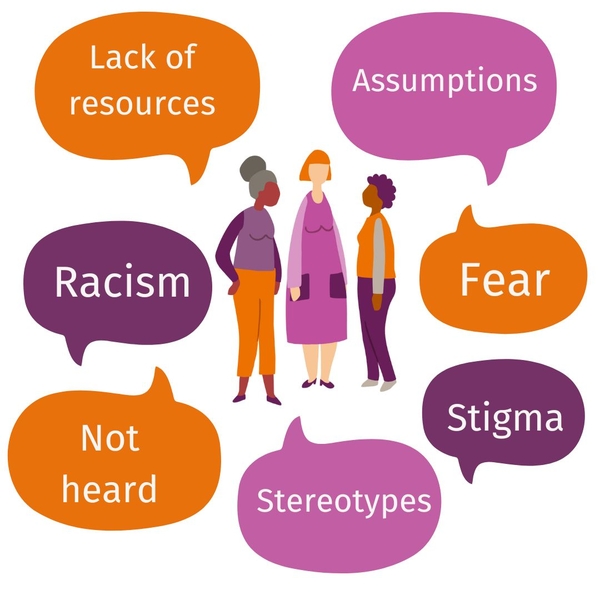
Read examples of organisations who are breaking barriers to accessing perinatal mental health care.
Happy Baby Community support people who:
The Maternal Mental Health Alliance ran a session with a group of Happy Baby Community doulas who had some invaluable insights about barriers and how they try to overcome them.
Learn more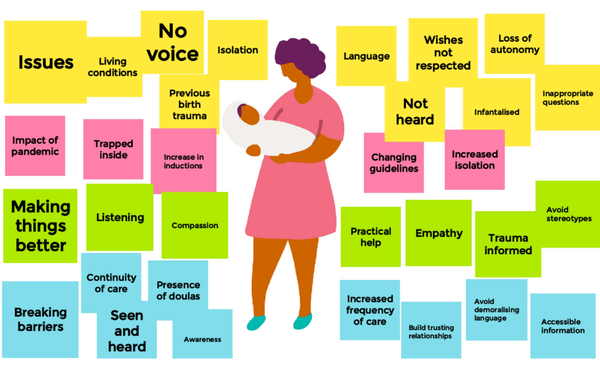
“We go to where young parents are and try and communicate in a way which works for them. We keep trying, even if we don’t hear back the first few times... Home visits are an important part of our approach. We often tackle immediate practicalities such as form filling and storage issues to help with wellbeing and create space for conversations.” Donna Francis, Acacia Family Support
“Thank you again for today, I really enjoy the groups, I feel I can speak freely without judgement of things I’ve held in for years and struggled to cope with.” Young mum via WhatsApp
Learn moreHome-Start Croydon hosts a parent and baby group called ‘Chill n Play’ through a partnership with Babyzone at the Legacy Youth Zone. Volunteers are parents themselves who have a good understanding of the challenges families may face. They recognise the importance of small gestures and the impact that these have on parents attending the group. They are good listeners and create a welcoming environment in which parents feel safe to share their experiences with other parents and have a voice. There are quite a few mums that do not have families around to support them through this new stage in their lives, leading to them feeling lonely and isolated. The volunteers themselves are very aware of the impact this situation has on families and they ensure to engage with every parent linking them up to a variety of family services that could benefit them.
“Everyone is welcome to ‘Chill n Play’ peer group for parents with their babies and toddlers. The group is led by volunteers that reflect the diversity of the community and who facilitate the building of trust through the understanding of the needs that parents may have. Their smallest gestures of kindness, their warmth, their listening abilities and the providing of information aim to give parents confidence in carrying out their parenting role.” Jacqui, Parent Champion Volunteer (Home-Start Croydon)
Learn moreThe Maternal Mental Health Alliance visited Babyzone Croydon to talk with staff and parents using the space. In their efforts to break barriers:
MEA is an organisation in Birmingham that connects Black perinatal women to each other, to perinatal services, to platforms that raise their voices, to safe spaces, to systems changes and to opportunities.
“We engage with and empower Black African, Caribbean and Mixed Heritage women and their families about their perinatal journey, from conception through to two years postnatal... We deliver workshops, programmes, training, and community research from living and lived experience, keeping service providers informed about the Black maternal experience at a grassroots level. Here at MEA, we work closely with the Local Maternity Systems in Birmingham to support their commitment to engage with Black maternal women for better and safer maternity service provision.”
Through lived and living experience, the MACs are in a unique position to gather data on the Black perinatal experience. They use surveys, lead small focus groups and co-ordinate perinatal community conversations focusing on the Black experience of pre-conception, pregnancy, birth, and early parenting including mental health and wellbeing.
The information that they gather is a starting point to identify the issues that are being faced by Black perinatal families. The role of MEA with the help of MACs is to encourage systems change in Birmingham and the wider regional West Midlands for better maternity services.
Learn moreThe MEA Maternity Ambassadors for Change (MACs) are advocates for better perinatal services within the Black community. We do this by collecting and analysing data from community lived and living experiences.
Amaka, MEA Maternity Ambassador for Change
Thanks to the work of MARG (Maternity Autism Research Group), there is research around birth experiences of autistic mothers, meaning there is more understanding around the impact of this ‘hidden’ experience:
Some NHS Trusts are developing Neurodiversity/Autism care pathways in their Maternity Services.
Learn moreAt the Amplifying Maternal Voices conference in March 2023, a key focus on religion and culture was highlighted. The valuable pragmatic strategies and community-led initiatives can integrate religious-based practices with health and social care support for women and their families, with both aspects of a mother’s experience.
We are not ‘hard to reach’, and breaking barriers is possible.
Jayde Edwards, Mental Health Foundation, speaking at the Young Mums Mental Health breakout session at the AMV conference
“Founded within the NW London Jewish community we understand that cultural factors can significantly influence the perception, expression, and treatment of perinatal mental health issues. Therefore, we have made it a priority to ensure that our services and programs are tailored to address the specific needs and cultural nuances of the communities we serve.
"At Menucha, we actively work to bridge the gap between cultural diversity and mental health support, ensuring that all services are accessible, relevant, and sensitive. We are committed to promoting cultural understanding for statutory services and breaking down barriers to ensure our clients receive the care they need.”
Rivki Dwek, CEO of Menucha
Learn more
In this series of audio clips, Fatima shares her experience of maternal mental illness as a newly single mother seeking asylum while pregnant with her second baby.

In this podcast, Chrissy talks about becoming pregnant again within months of giving birth, her struggles with mental health and how it inspired her to support other mums.
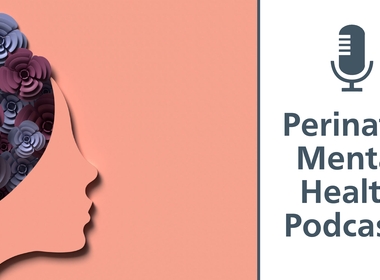
A miniseries focussing on different areas of perinatal mental health from the perspective of healthcare professionals, women and birthing people, and partners.

This podcast from the Royal College of Midwives looks at the the role of specialist midwives, and investment needed from the Government to improve perinatal mental health care.
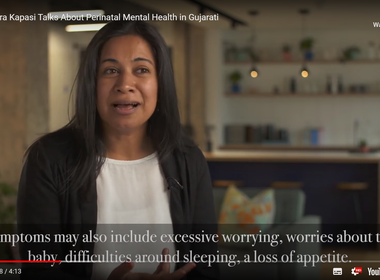
Find videos about the perinatal mental health experiences of young parents, and Black, Asian and multi-ethnic mums and birthing people.
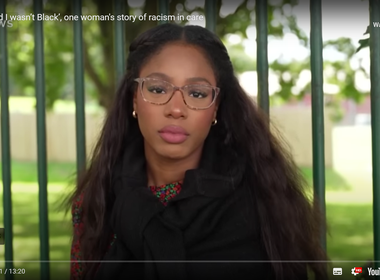
In Channel 4 News' #GoneTooFar, Louise spoke about being moved far away and how she had never experienced racism until the move.
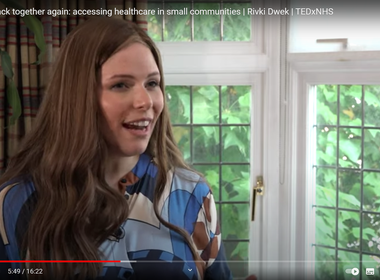
Rivki shares her experience and how she has set out to create links between small Orthodox Jewish communities and national services.
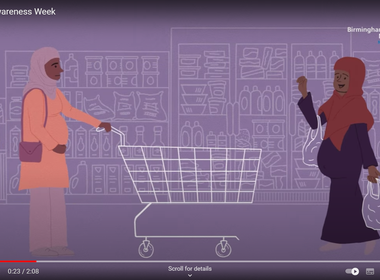
This baby loss awareness film was developed in partnership with Birmingham and Solihull Mental Health NHS Foundation Trust.

Jess and Anisah share their experiences of pregnancy, birth and maternity services as Black mothers in the UK.

Watch the 'Maternal mental health experiences of young mums' report launch hosted by the Children and Young People’s Mental Health Coalition and the MMHA.

'Purple Ella' shares her personal experience of pregnancy and the areas which she thinks may have been affected by her autism.
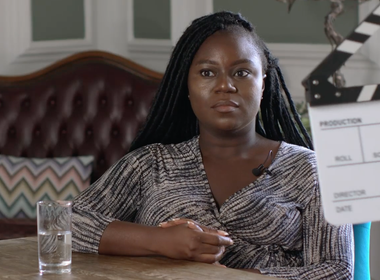
'The Bias Trap – A Way Forward' is a training documentary exploring race inequalities within the NHS maternity system.
Something as simple as asking someone how they are or making them a hot drink can make such a difference.
Please note the MMHA is not responsible for the content of external sites.
Explore the other sections, or head back to the Toolkit landing page.
Understand how groups and organisations can demonstrate the impact of local initiatives. Ideas here may be useful for those seeking funding or to highlight gaps in current perinatal mental health services.
Explore ways to connect with local organisations and advocate for positive changes in perinatal mental health services. Find examples and ideas for local groups and individuals looking to collaborate and influence their local landscape.
Learn how to share stories about perinatal mental health in a safe way. Ideas here may be useful to local groups engaging those with lived/living experience, as well as for people with lived/living experience wanting to tell their stories safely.

This toolkit offers creative ideas and practical tools to empower individuals in shaping perinatal mental health care at the local level.